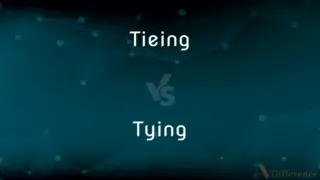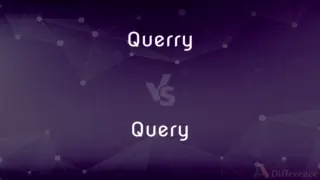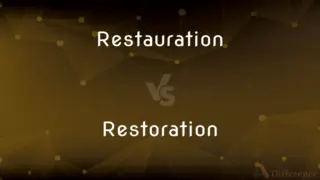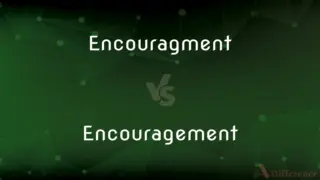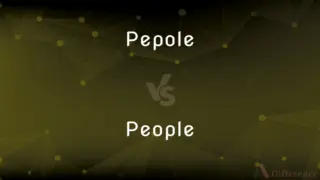Potentional vs. Potential — Which is Correct Spelling?
By Tayyaba Rehman — Updated on March 28, 2024
"Potentional" is a common misspelling. The correct spelling is "Potential," referring to latent qualities or abilities that may be developed.
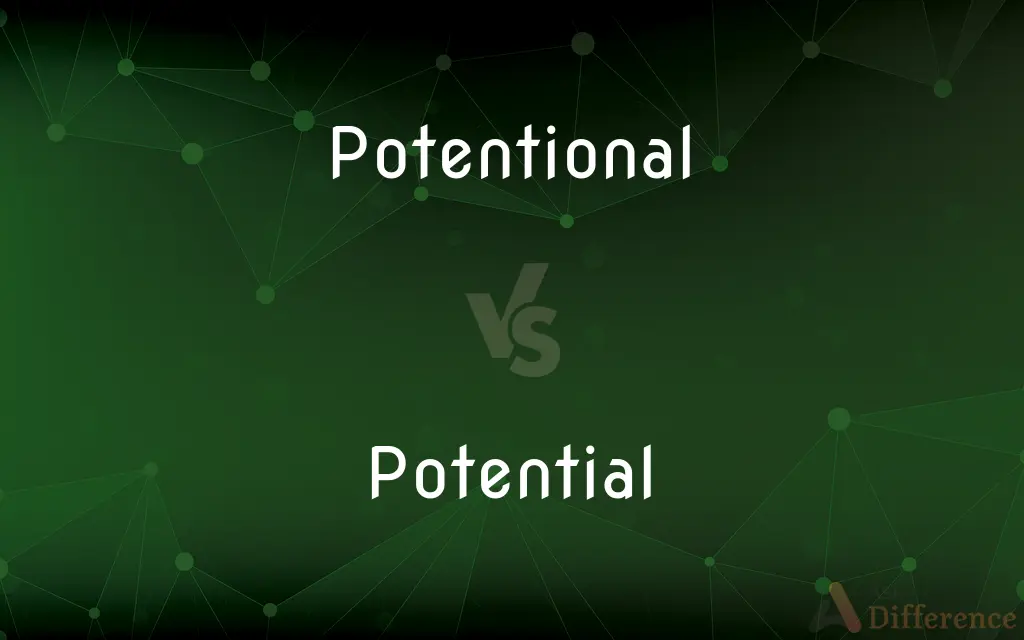
Table of Contents
Which is correct: Potentional or Potential
How to spell Potential?

Potentional
Incorrect Spelling

Potential
Correct Spelling
ADVERTISEMENT
Key Differences
Remember the word "potent" as the beginning of "potential."
Use a mnemonic: "POssible TENT of abilities is POTENTIAL."
Think of "potential energy," a term in physics, for correct spelling.
Visualize a pot of untapped ability, representing potential.
Note that there's no "ion" in the middle of "potential."
ADVERTISEMENT
How Do You Spell Potential Correctly?
Incorrect: The team saw great potentional in the young player.
Correct: The team saw great potential in the young player.
Incorrect: There is a lot of potentional for growth in this market.
Correct: There is a lot of potential for growth in this market.
Incorrect: He has the potentional to become a successful entrepreneur.
Correct: He has the potential to become a successful entrepreneur.
Incorrect: She is exploring her potentional career paths.
Correct: She is exploring her potential career paths.
Incorrect: The potentional benefits of the new policy are significant.
Correct: The potential benefits of the new policy are significant.
Potential Definitions
The capacity to become or develop into something in the future.
The plot of land has great potential for development.
Referring to latent qualities or abilities.
She has the potential to become a great athlete.
Possible, as opposed to actual.
This is a potential solution to our problem.
A quality in someone or something that is a sign of future success.
His leadership showed great potential.
Potential generally refers to a currently unrealized ability. The term is used in a wide variety of fields, from physics to the social sciences to indicate things that are in a state where they are able to change in ways ranging from the simple release of energy by objects to the realization of abilities in people.
Capable of being but not yet in existence; latent or undeveloped
A potential problem.
A substance with many potential uses.
(Grammar) Of, relating to, or being a verbal construction with auxiliaries such as may or can; for example, it may snow.
The inherent ability or capacity for growth, development, or future success
An investment with a lot of potential.
A singer who has the potential to become a major star.
The possibility that something might happen or result from given conditions
A tense situation with the potential to turn into a riot.
Farming practices that increase the potential for the erosion of topsoil.
See electric potential.
See gravitational potential.
See magnetic potential.
(Grammar) A potential verb form.
Currently unrealized ability (with the most common adposition being to)
Even from a young age it was clear that she had the potential to become a great musician.
(physics) The gravitational potential: the radial (irrotational, static) component of a gravitational field, also known as the Newtonian potential or the gravitoelectric field.
(physics) The work (energy) required to move a reference particle from a reference location to a specified location in the presence of a force field, for example to bring a unit positive electric charge from an infinite distance to a specified point against an electric field.
(grammar) A verbal construction or form stating something is possible or probable.
Existing in possibility, not in actuality.
(archaic) Being potent; endowed with energy adequate to a result
(physics) A potential field is an irrotational (static) field.
(physics) A potential flow is an irrotational flow.
(grammar) Referring to a verbal construction of form stating something is possible or probable.
Being potent; endowed with energy adequate to a result; efficacious; influential.
Anything that may be possible; a possibility; potentially.
In the theory of gravitation, or of other forces acting in space, a function of the rectangular coordinates which determine the position of a point, such that its differential coefficients with respect to the coördinates are equal to the components of the force at the point considered; - also called potential function, or force function. It is called also Newtonian potential when the force is directed to a fixed center and is inversely as the square of the distance from the center.
The energy of an electrical charge measured by its power to do work; hence, the degree of electrification as referred to some standard, as that of the earth; electro-motive force.
The inherent capacity for coming into being
The difference in electrical charge between two points in a circuit expressed in volts
Existing in possibility;
A potential problem
Possible uses of nuclear power
Expected to become or be; in prospect;
Potential clients
Expected income
Describing something that can potentially happen.
There's a potential risk involved.
Potential Meaning in a Sentence
The project has a lot of potential to benefit the community.
They are potential candidates for the scholarship program.
The potential impact of climate change is alarming.
He is a potential buyer for the property.
Her potential in the field of science is undeniable.
This area is a potential site for the new factory.
We need to assess the potential risks involved in the venture.
The study highlights the potential advantages of early education.
We're just scratching the surface of AI's potential.
Evaluating the potential harm is a necessary step before proceeding.
She has shown potential in leadership roles.
The potential for conflict in the region remains high.
The device has the potential to revolutionize the industry.
The potential for misunderstanding is high in online communications.
The potential consequences of inaction are too severe to ignore.
The potential savings from using this technology could be substantial.
The potential for growth in this sector is immense.
The potential rewards of this investment could be significant.
They discussed the potential changes in the law.
Their team has the potential to win the championship.
Understanding your potential is key to personal development.
Unlocking the potential of renewable energy is crucial for our future.
This invention has the potential to change how we access information.
Recognizing the potential in others is a valuable skill.
The potential uses of this discovery are wide-ranging.
Potential Idioms & Phrases
Unrealized potential
Refers to abilities or talents that have not yet been developed or used to their fullest extent.
The coach is focused on helping players achieve their unrealized potential.
Potential for success
The possibility or likelihood that someone or something will be successful.
Her innovative ideas have a great potential for success in the market.
Tap into potential
To access or make use of someone's or something's capabilities that have not been utilized before.
The company aims to tap into the potential of emerging technologies.
Unlocking potential
The process of discovering and developing someone's or something's full capabilities.
The new training program is all about unlocking potential in employees.
Common Curiosities
Why is it called Potential?
It's called "potential" because it describes the capacity or possibility for future development or occurrence.
What is the verb form of Potential?
The related verb is "potentiate."
What is the root word of Potential?
The root word is "potent" derived from Latin "potens" meaning powerful.
What is the plural form of Potential?
Potentials.
Which conjunction is used with Potential?
Any conjunction can be used with "potential" based on context, such as "and" or "but."
Is Potential an abstract noun?
Yes, when used as a noun, "potential" is abstract, referring to a concept or idea.
Is Potential a negative or positive word?
Neutral; it describes a possibility or capacity without positive or negative connotation.
Which preposition is used with Potential?
Typically, "for" as in "potential for growth."
What is the pronunciation of Potential?
It is pronounced as /pəˈtɛnʃəl/.
Which vowel is used before Potential?
The choice of vowel before "potential" depends on the context. No specific vowel always precedes it.
Is Potential a collective noun?
No, "potential" is not a collective noun.
Which article is used with Potential?
Both "a" and "the" can be used with "potential" depending on context.
Is Potential a countable noun?
When used as a noun, it can be countable as in "several potentials."
What is a stressed syllable in Potential?
The second syllable, "ten," is stressed.
What is the singular form of Potential?
Potential itself is in its singular form.
Is Potential a noun or adjective?
Potential can be both a noun and an adjective.
Is Potential a vowel or consonant?
"Potential" is a word, not a single letter. It contains both vowels and consonants.
How many syllables are in Potential?
There are four syllables in "potential."
How do we divide Potential into syllables?
It can be divided as po-ten-ti-al.
What is the opposite of Potential?
The opposite could be "actual" or "realized."
Which determiner is used with Potential?
Determiners like "this," "that," "his," or "her" can be used with "potential" depending on context.
What is the first form of Potential?
Potential does not have verb forms as it's primarily a noun/adjective. The related verb "potentiate" would have its own forms.
Is the word Potential imperative?
No, "potential" is not in imperative form.
What part of speech is Potential?
It is both a noun and an adjective.
What is another term for Potential?
Another term could be "capability" or "possibility."
Is Potential an adverb?
No, "potential" is not an adverb.
Is the Potential term a metaphor?
Not inherently, but it can be used metaphorically in certain contexts.
Share Your Discovery
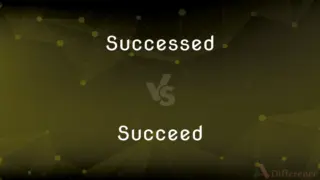
Previous Comparison
Successed vs. Succeed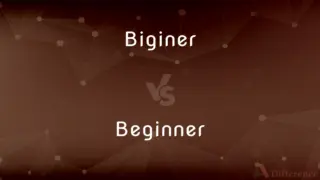
Next Comparison
Biginer vs. BeginnerAuthor Spotlight
Written by
Tayyaba RehmanTayyaba Rehman is a distinguished writer, currently serving as a primary contributor to askdifference.com. As a researcher in semantics and etymology, Tayyaba's passion for the complexity of languages and their distinctions has found a perfect home on the platform. Tayyaba delves into the intricacies of language, distinguishing between commonly confused words and phrases, thereby providing clarity for readers worldwide.

